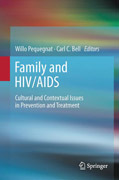
Family and HIV/AIDS: cultural and contextual issues in prevention and treatment
Pequegnat, Willo
Bell, Carl C.
Three decades into the HIV pandemic, the goals remain clear: reduce the number of infections,improve the health outcomes of those who are infected, and eliminate disparities in care. And one observation continues to gain credence: families are a powerful resource in preventing, adapting to, and coping with HIV. Recognizing their complex role as educators, mentors, and caregivers, Family and HIV/AIDS assembles a wealth of findings from successful prevention and intervention strategies and provides models for translating evidence into effective real-world practice. Chapters spotlight the differing roles of mothers and fathers in prevention efforts, clarify the need for family/community collaborations, and examine core issues of culture,ethnicity, gender, and diagnosis (e.g., minority families, adolescents with psychological disorders). Throughout, risk reduction and health promotion are shown as a viable public health strategy A reference with considerable utility across the health, mental health, and related disciplines,Family and HIV/AIDS will be a go-to resource for practitioners working with families, researchers studying at-risk populations, administrators seeking to create new (or evaluate existing)prevention and care programs, and policymakers involved in funding such programs. Addresses the contribution of different families members to prevention andtreatment of its members. Uses a definition of families that recognizes the reality of today’s families, the latest research findings gathered into one volume that have implications for preventing and treating HIV/AIDS and other major diseases. Outlines the challenges for the next decade and suggests some creative solutions. INDICE: Foreword. Part I: Overview of Family and HIV and Mental Health. Families and HIV/AIDS: First Line of Health Promotion and Disease Prevention. Family as the Model for Prevention of Mental and Physical Health Problems. The Role of Settings in Family Based-Prevention of HIV/STDs.- Part II: Role of Families in Prevention and Care. Parents as AIDS educators. Mothers: The Major Force in Preventing HIV/STD Risk Behaviors. Fathers and HIV: A Missing Factor in Developing Interventions but Not in the Lives of Their Children.- Communities and HIV.- Couples-based HIV Prevention and Treatment:State of Science, Gaps and Future Directions.- The Role of Families Among Orphans and Vulnerable Children In Confronting HIV/AIDS in Sub-Saharan Africa.- Collaborating with Familiesand Communities to Prevent Youth HIV Risk Taking and Exposure. Families and HIV Medical Adherence. Part III. Ethnic, Cultural, and Gender Issues in Families. Family-Based HIV Prevention with African American and Hispanic Youth. - Parents as Agents of HIV Prevention for Gay,Lesbian, and Bisexual Youth. Family-Based HIV Prevention for Adolescents with Psychiatric Disorders. Part IV. Implementing Family Systems Evidence-Based Prevention. Adaptation of Interventions for Families Affected by HIV. Promoting Family-Focused Evidenced-Based Practice in Frontline HIV/AIDS Care. Part V. Challenges for the Future. Future Directions for Family-Based Prevention and Treatment Research: Challenges and Emerging Issues.
- ISBN: 978-1-4614-0438-5
- Editorial: Springer New York
- Encuadernacion: Cartoné
- Páginas: 364
- Fecha Publicación: 28/12/2011
- Nº Volúmenes: 1
- Idioma: Inglés
